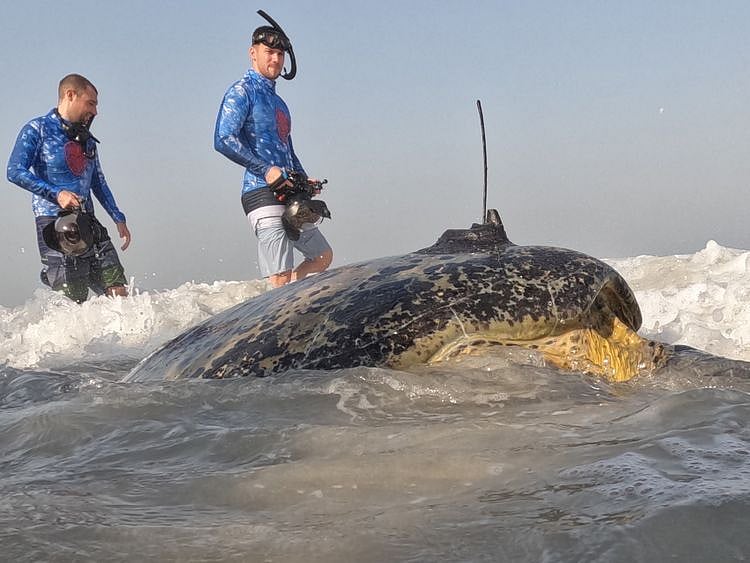Watch: Dubai’s Turtle Rehabilitation Project releases 14 endangered sea turtles
Three of the larger turtles fitted with satellite transmitters for tracking

Also In This Package
UAE hits 95% vaccination, know the countries now open
Look: India Pavilion dazzles with Navratri performances
Sheikh Hamdan explores Mushrif mountain bike track
Look: Brand Dubai, RTA launch ‘Parking Metres Project'
In pictures: Sheikh Hamdan shares falconry skills
Abu Dhabi's new ‘Blue Schools Initiative’ explained
Dubai: Jumeirah Group’s Dubai Turtle Rehabilitation Project has released a batch of 14 endangered Green, hawksbill and loggerhead sea turtles from Jumeirah Al Naseem beach.
Under the watchful eyes of the group’s marine specialists — including Barbara Lang-Lenton Arrizabalaga, the director of Aquarium at Burj Al Arab Jumeirah, as well as Shaikh Fahim bin Sultan bin Khalid Al Qasimi, the project ambassador — the marine creatures were released after being rescued, nurtured and rehabilitated over an extensive period of medical care and recovery.
Representatives from Dubai Municipality, Dubai Falcon Hospital, Dubai Central Veterinary Research Laboratory, Emirates Nature–WWF and Abu Dhabi Environment Agency, as well as educational bodies, marine biologists, media representatives and in-house guests participated in the event, showing their support for these magnificent marine creatures.
Biology of migratory species
To support ongoing conservation efforts, three of the larger turtles were fitted with top-of-the-range satellite transmitters, donated by Al Qasimi to track and capture key data. The resulting information will help the team to measure the success of its rehabilitation process and better understand the biology of these migratory species, in addition to offering further educational opportunities. In addition, all turtles were fitted with microchips so that they could be traced back to the project if found at any time after their release.
The event was particularly poignant for Al Qasimi, as earlier this year he had rescued a large Green sea turtle that he had discovered entangled in a fishing line during a free-diving trip. Al Qasimi named her Farah and worked closely with the team in her recovery. “Having seen first-hand the damage that can be done to sea turtles, I am extremely proud to act as an ambassador for the Dubai Turtle Rehabilitation Project and the important work they do in nursing these precious animals back to health and returning them to their natural habitat,” he said.
‘Two landmark achievements’
Released alongside Farah was a large 50-year-old Green turtle named ‘Jumeirah’ in honour of the UAE’s upcoming Golden Jubilee and the district that has grown and prospered with it. “This turtle is the perfect embodiment of two landmark achievements — 2,000 turtles successfully rehabilitated and released and the celebration of 50 years of the UAE. It is amazing to think that ‘Jumeirah’ was born at the same time as our great nation and I wish that both continue to thrive alongside each other,” he added.
Both Green turtles were fitted with trackers, in addition to a loggerhead that was named Nacar, meaning ‘Mother of Pearl’, by the public after a social media competition across Jumeirah Group’s channels.
‘Satellite tagging’
“Our job at the Dubai Turtle Rehabilitation Project is not only to provide critical care and aid in the rehabilitation of injured and sick turtles in the UAE, but also to advance our knowledge of their behaviour, navigation routes and feeding territories,” said Arrizabalaga. “Satellite tagging of our rehabilitated turtles is a crucial part of the work we do, enabling us to gather and share data with other global organisations to aid in our understanding of these majestic, endangered species, so we can better protect them in the first place.”
To further support its ongoing efforts, the Dubai Turtle Rehabilitation Project team and Al Qasimi are in the process of setting up a new dedicated toll-free hotline, 800TURTLE (800 887853), that members of the public can call if they notice a distressed or injured sea turtle.
Also Read
UAE to tap hydrogen as a clean energy sourceFour Aster hospitals in UAE to install solar energy panelsSharjah, Jersey to cooperate on protection of nature reservesFirst phase stretching 20km of Dubai’s first mountain bike track now readyMost predominant species
Jumeirah Group has been successfully tending to sick or injured sea turtles since the inception of its dedicated programme, in collaboration with Dubai’s Wildlife Protection Office, the Dubai Falcon Hospital and the Central Veterinary Research Laboratory. With annual rescue figures averaging more than 100 turtles, the most predominant species tended to in the facility include Hawksbill and Green turtles, while Loggerhead and Olive Ridley turtles are also occasionally brought in.
Sign up for the Daily Briefing
Get the latest news and updates straight to your inbox
Network Links
GN StoreDownload our app
© Al Nisr Publishing LLC 2026. All rights reserved.